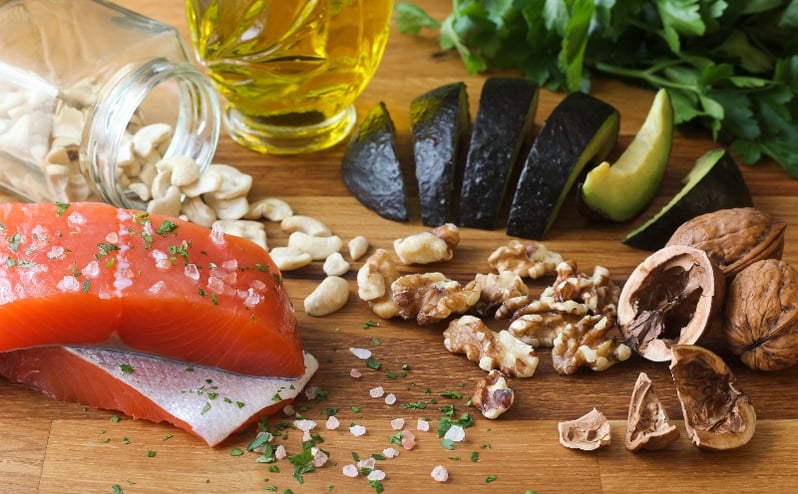
More than six million people — 1 in 9 over the age of 65 — are living with Alzheimer’s disease. The thought of losing your memory is a scary prospect, and no one knows what the future holds for any of us. Still, there’s a lot you can do to reduce your risk of Alzheimer’s and other dementias. While no single food will prevent dementia, emerging evidence suggests that the Mediterranean diet may improve cardiovascular health while reducing the odds of developing Alzheimer’s. Here are seven foods that may reduce your chances of developing Alzheimer’s.
Fatty Fish
Fatty fish such as tuna, mackerel, lake trout, sardines and salmon are high in Omega-3 fatty acids, which work wonders for your health. More than 20 years of research suggest that these fatty acids may also lower your lifetime risk of developing Alzheimer’s and other dementias. They may also improve other measures of brain health, such as by reducing the risk of depression. To get the best results, aim for two to three servings per week.
Berries
Berries such as blueberries, blackberries and raspberries are rich in antioxidants that can help reverse the lifetime effects of oxidative stress. Over time, the potent antioxidants in berries can slow cellular damage that leads to a wide range of diseases, including cancer and heart disease. A group of chemicals called anthocyanins found in purple, blue and red berries cross the blood-brain barrier, preventing damage to brain cells. This makes berries one of the top foods that prevent Alzheimer’s.
Tea
It’s not just foods that reduce your chances of developing Alzheimer’s. The right drinks can make an impact too. Tea is rich in a group of plant chemicals called flavonoids, which may improve overall health while reducing the risk of developing Alzheimer’s. In one study, people with the highest flavonoid intake enjoyed a 40% reduction in risk of dementia after about 20 years. Other studies have found that caffeine may lower the lifetime risk of dementia while promoting better cardiovascular health. To get the most benefits, consider caffeinated teas such as green or black tea.
Coffee
Think you need to reduce your caffeine intake for healthy aging? Think again. Numerous studies suggest that caffeinated coffee may promote long-term brain health. Several studies have shown that coffee consumption decreases activity of beta-amyloid protein, which builds the plaques that lead to Alzheimer’s. Overall, coffee drinkers enjoy an Alzheimer’s risk reduction of 30% to 60%. Moderate coffee consumption of about two to five cups per day also correlates with a lower risk of type 2 diabetes, liver cancer, endometrial cancer and heart disease. To get the most benefits, avoid excessive use of sweeteners, which can pack on the pounds and wreak havoc with blood sugar.
Dark Leafy Greens
Dark leafy greens are delicious in salads and form a cornerstone of the brain-healthy Mediterranean diet. Rich in potassium and B-complex vitamins, numerous studies suggest that dark leafy greens may improve brain health and stave off dementia. Dark leafy greens may also help reverse the effects of some unhealthy eating habits. Too much meat can cause accumulations of homocysteine, which increases the risk of dementia. Dark leafy greens help reverse this trend.
Healthy Oils
Healthy oils such as olive and coconut oil form a small part of the Mediterranean diet and help add flavor to food. Oil-based salad dressing, in particular, is rich in vitamin E, a potent antioxidant that can help protect your brain from the effects of aging. So consider making healthy oils a part of your diet.
Wine
Wine contains a number of chemicals, including phytochemicals and antioxidants, that may promote long-term health in moderate doses. Drinking a few glasses of wine a week correlates with a lower risk of cardiovascular disease and diabetes as well as a reduced risk of Alzheimer’s. The complex cocktail of plant chemicals in wine may play an important role in preventing memory loss. Conversely, drinking to excess elevates the risk of these diseases. So enjoy a glass of wine with dinner or on the weekend with your friends while avoiding binge drinking.
Staying mentally active as you age can keep you sharper, happier and healthier. The right senior living community is an important ingredient in the recipe for healthy aging. Learn more about how the right community can help you make the most of the next chapter of your life.
.webp?width=1140&height=1650&name=Med%20%20MIND%20Diets-2%20(2).webp)





